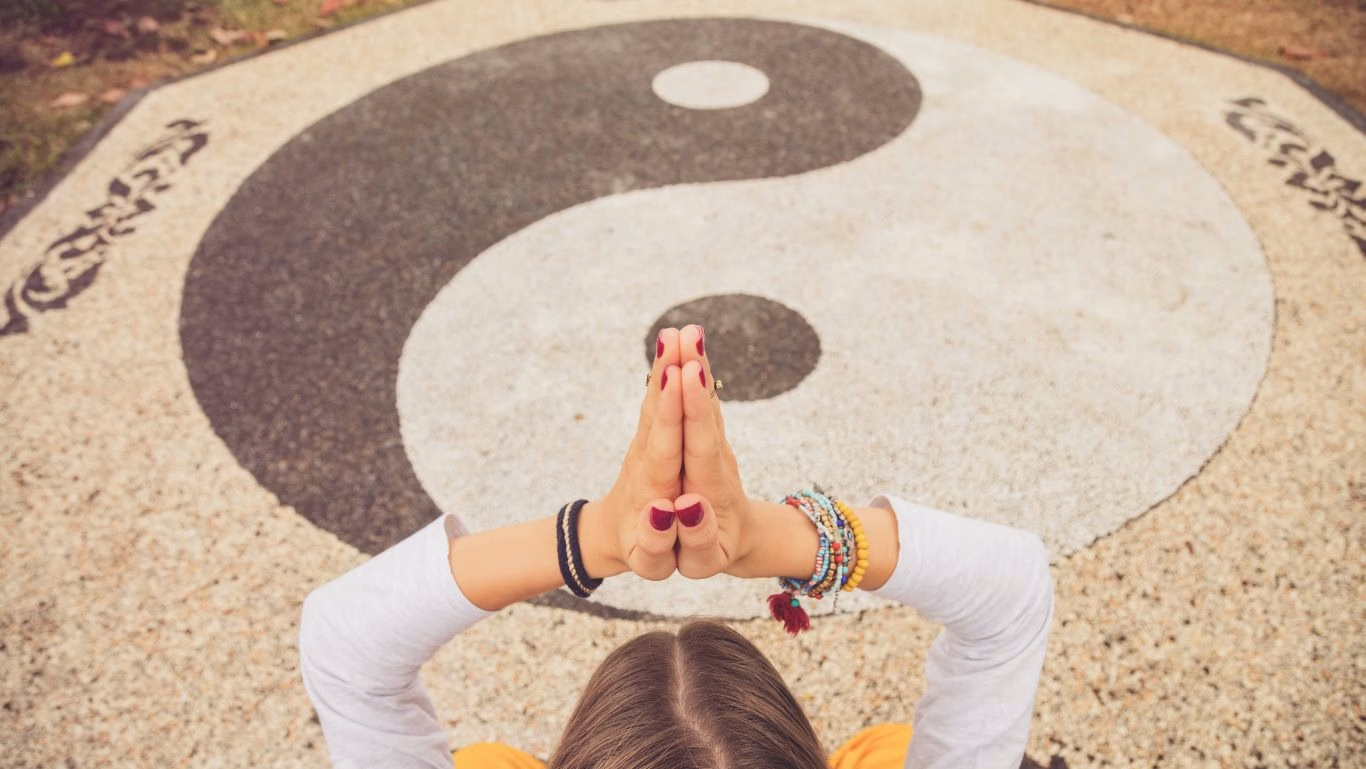Many people think of religion as a set of strict rules, rituals, or dogmas—but Taoism is different. It’s not a “classic” religion in the sense of having one central authority, fixed doctrines, or rigid commandments. Instead, it’s a philosophy, a way of life, and, for some, a spiritual practice that teaches living in harmony with the natural flow of the universe. It is also known and pronounced as Daoism, a philosophy that originated in ancient China around the 6th century.
Taoism can be both:
- Philosophical: based on texts like the Tao Te Ching, which is the central text of Taoism, full of wisdom and thought-provoking paradoxes. ‘Tao’ meaning the way, ‘Te’ meaning virtue or integrity, and ‘Ching’ meaning great book.
- Religious: including temples, rituals, deities, meditation, energy practices, and traditional Chinese medicine.
But whether you approach it as philosophy or religion, Taoism offers practical guidance for living with less stress, more harmony, and a deeper connection to nature.
Taoism is based on the idea that behind all material things and all the change in the world lies one fundamental, universal principle: the way of Tao, which is the interplay between five elements (i.e., metal, wood, water, fire and earth), and the interdependence between the macrocosm and the microcosm (e.g. man’s relation to the universe). This principle gives rise to all existence and governs everything – all change and all life.
More: Ho’oponopono: The easiest healing technique
1. What is Tao?
Tao (道) means “the Way”. It is the underlying principle of everything, the natural order of the universe.
The Tao cannot be fully understood with words or the rational mind; it can be considered as an understanding of energy, presence, and the relation or bringing together of opposites. The Tao is to be lived and felt rather than conceptualized.
Lao Tzu, founder of Taoism, wrote: “The Tao that can be told is not the eternal Tao.”
More: What is Buddhism? A beginner’s guide to its core beliefs


2. Wu Wei: The art of effortless action
Wu Wei (無為) literally means “non-doing”, but it doesn’t mean being lazy.
It’s about:
- acting without forcing
- moving with the natural flow
- achieving results without unnecessary struggle
Think of water: it never fights obstacles—it flows around them, yet it is unstoppable. That’s Wu Wei in action.
3. Yin and Yang: Balance in everything
Yin and Yang are opposite but complementary forces.
- Yin: quiet, dark, receptive, cool
- Yang: active, bright, assertive, warm
And they work like complementary opposites:
- night and day
- active and passive
- cold and warm
- silence and sound
This is the tricky part for many people. Yin is not “bad,” and Yang is not “good.” They are just different qualities —the key is balance.. Life is about harmonizing these forces within yourself, your relationships, and your surroundings. Problems arise only when one dominates excessively, upsetting the balance.
Example:
- Too much Yang (activity, heat, tension) → exhaustion or stress
- Too much Yin (passivity, cold, stillness) → stagnation or depression
Yin and Yang are not static; they are constantly moving and changing. One can dominate temporarily, but the other will return. Think of a pendulum: when it swings one way (Yin), it inevitably swings back (Yang). Life is about flowing with this rhythm, not resisting it.
More: Importance of balancing masculine and feminine energy
4. Living simply and naturally
Taoism teaches simplicity over complication, spontaneity over rigid planning, and being in tune with nature rather than fighting it. It encourages us to shed unnecessary desires and distractions, recognizing that true wisdom lies not in accumulating more, but in appreciating and wanting less.
By letting go, life becomes lighter and clearer, and we begin to see the beauty in ordinary moments. Nature never hurries, yet everything is accomplished in its own time, teaching us to move with patience and grace. The more we resist the natural flow, the more we create tension and struggle; the more we embrace it, the more we thrive. In this simplicity and stillness, clarity and understanding naturally emerge, revealing the profound harmony that Taoism invites us to experience in our daily lives.
More: Healing through the Theta Healing technique
5. Health, energy, and longevity
Taoism is famous for practices that support health and vitality:
- Qi Gong (energy exercises)
- Tai Chi (slow, flowing martial arts)
- Meditation and breathing techniques
All of these focus on harmonizing your body, mind, and life energy (Qi).
More: Healing through nature: How the environment restores our well-being
6. Paradoxes and puzzles
Taoism is well known for its emphasis on maintaining health and cultivating life energy, known as Qi. Practices like Qi Gong, Tai Chi, and meditative breathing are designed to harmonize body, mind, and spirit, helping to restore balance and vitality.
Taoist texts are full of paradoxes that can be confusing at first:
“The soft overcomes the hard.”
“He who knows does not speak; he who speaks does not know.”
“To be full, empty yourself.”
These are meant to make you think, not to provide simple answers. Taoism values insight over instruction.
Taoist teachings emphasize that health is not just the absence of illness, but a state of energetic alignment with the natural rhythms of life. By moving gently, breathing mindfully, and observing the cycles of nature, practitioners can support longevity, prevent disease, and develop a sense of inner calm. In Taoism, the body is seen as a microcosm of the universe—care for it thoughtfully, and it flows with strength and resilience.
7. There is no central authority
One of the things that makes Taoism unique—and sometimes confusing—is that it doesn’t have a single “head” or one universal set of rules like some other religions.
1. No one sacred book
- While the Tao Te Ching (by Laozi) and Zhuangzi are foundational texts, Taoism doesn’t rely on just one scripture.
- Different schools and teachers may focus on different texts, poems, or oral teachings.
2. No single church or priesthood
- Unlike religions with centralized institutions, Taoism doesn’t have one global church or hierarchy.
- Temples exist, and there are Taoist priests, but practices and rituals vary widely depending on the region, school, or teacher.
3. No rigid set of rules
- Taoism is not about strict commandments or moral absolutes.
- Instead, it offers guiding principles, like living in harmony with nature and practicing balance (Yin and Yang).
- This means you can adapt Taoist wisdom to your own life, experimenting with meditation, movement, philosophy, or rituals in ways that work for you.
4. Freedom of interpretation
- Different teachers, lineages, and Taoist schools interpret ideas differently.
- This can seem confusing at first, but it also makes Taoism flexible and personal.
- You’re encouraged to explore, reflect, and integrate what resonates with you, rather than blindly following a set of rules.
More: A Life Path calculator and meaning
How is Taoism different?
Taoism is different from both Eastern and Western religions, since it is non-attached to a specific god or a ruler. It is not about the world events being dictated by a specific deity, but rather acknowledges the intelligence and interconnection of nature and yin and yang concepts that make up the happenings of life. Taoism entrusts the experience of life to each individual person and their relation to the inner and outer worlds, as opposed to most religions, which focus on the individual worshipping and having faith in some higher power.
Taoism is also different from other spiritualities and religious teachings in that it embraces contradiction and paradox as an essential part of life and spiritual understanding. Most mainstream religions have clear instructions on what is considered right and wrong and what actions are considered moral. Taoism embraces both light and dark as equally spiritual and necessary experiences.
The teachings of Taoism are very accepting and non-judgmental, and this has made it a very popular philosophy for modern-day open-minded individuals who wish to easily embody a spiritual way of life. Living with an awareness of the Tao and considerations of Taoism can provide a simple and effective way to spiritually navigate the diversity of modern life as it evolves in each present moment.
Why are so many people drawn to Taoism?
People are drawn to Taoism for many reasons, but at its heart, it appeals to those seeking balance, peace, and harmony in a chaotic world. Taoism offers practical wisdom on how to act effectively without forcing, live in tune with nature, and navigate life’s ups and downs with flexibility and grace.
Taoism attracts those interested in cultivating energy, improving health, and exploring spiritual insight without rigid dogma or institutional constraints. Its poetic and paradoxical teachings invite reflection and personal growth, making it both a philosophy to study and a lifestyle to embody. Ultimately, Taoism resonates with anyone seeking a way to flow with life rather than resist it, discovering clarity, fulfillment, and a profound sense of connection along the way. More: Consistency is a key to success: Learn these truths








